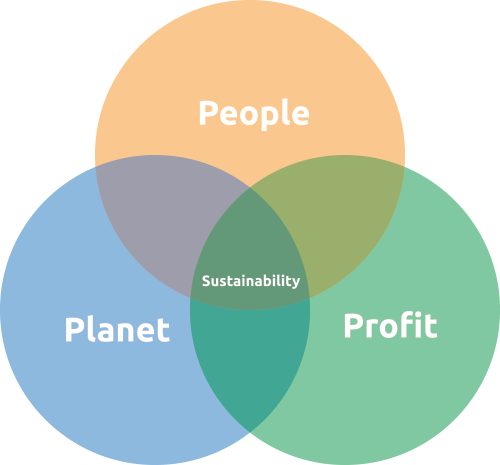We discuss what the sustainability term 'triple bottom line' means, and how it relates to your business.
These days it seems there are more definitions of sustainability than you can shake a stick at. From classic descriptions to new, modern twists, everyone's trying to imprint their opinion on the sustainability movement.
In our opinion, and the opinion of a lot of our clients, all that does is muddy the waters, and scare people away. Far too often people deliver conflicting (and wrong) definitions of sustainability.
Sustainable? Yes, that means our products last a long time. Wrong.
Sustainable? Sure, that means we have all our environmental permits. Wrong again.
Sustainable? Of course, we're sustainable, we switched out our light bulbs for more energy-efficient models last year. Really? Come on.
Sustainable? Certainly, we're LEED Certified! Unless you're a building, that's impossible.
Fortunately, there's one common term we see thrown around a lot, it's "triple bottom line". So let's discuss this baseline definition of sustainability and get to the bottom of this.

Triple Bottom Line and Classic Definitions of Sustainability
Sustainability is a lot like art. It's not the easiest thing to define. But, most of us are familiar with the idea of a "bottom line".
In financial terms, it's the bottom of the balance sheet, after the expenses have come from the revenue, showing what's left. It's where the rubber hits the road, the end result - you know, it's the bottom line!
Consider sustainability in a similar light. But instead of a balance sheet, think of three distinct areas to consider.
People. Planet. Profit.
People & the Triple Bottom Line
Sustainability involves people. Yes, people. Your staff, neighbors, shareholders, etc. Consider things like social or societal impacts.
How are your employees treated? Are they involved in your organization, are they working in safe conditions, are they paid well, is your turnover rate high, do you have health or retirement plans?
How about your community? Are you an active participant in the community? Do you support local efforts, anything from the Girl Scouts to the volunteer fire department to local environmental causes?
What about the people you sell your product to? Or how about the people you buy your raw materials & supplies from? Are you conducting supply chain management?
It goes on, but you get the point.
Sustainability involves the consideration of people. You can make your product or service in a manner that directly benefits all people involved, or you can do the opposite. When you're operating in a manner that's beneficial to people, then you're operating in a sustainable manner when it comes to the People part.
Planet Earth & the Triple Bottom Line
This one is really easy to discuss. This, for the most part, concerns your environmental impacts, both good and bad, as well as the impacts of your products.
This can include everything from the factory you operate, to the fleet of vehicles you use, to your suppliers, and more than you can even imagine.
More or less, you're trying to determine how much of an environmental impact you have.
How much waste do you produce, how much energy do you use, how much do you contribute to climate change? What about your products? What about your processes? What about your materials? It's a comprehensive, holistic look at all areas of potential environmental impact caused by you running your business.
Notice that I haven't said "Do you have all your permits?", since this is a given. Sustainability is beyond mere basic environmental regulatory compliance, and considers a whole lot more about your potential to impact the environment.
For example, there's no law against operating fuel inefficient equipment, but if you're helping to exhaust this planet's precious natural resources at a rate above what you could be doing, then you're not sustainable.
It's looking beyond the normal scope of environmental impact, to areas like resource product and use, the end life of your product, etc. Always, always, always think big picture.
Doing as much as you can to reduce or eliminate your impact and your use of natural resources such as fuel and clean water, then you're operating in a sustainable manner. So, you're on the right track as far as the Planet part is concerned.
Profit & the Triple Bottom Line
This is the tricky part since this requires a change in thinking for a lot of us. We tend to think in the traditional manner about "environmental" matters, that they cost, they don't pay.
There are no savings to be found by going green, right? Wrong.
Sustainability isn't some new fad designed to take more of our hard-earned money. The world is changing, and pretty quickly for those who are watching. Being sustainable - truly sustainable - helps with profitability, rather than hurting it.
First off, if you're acting in a sustainable manner, you should be in complete compliance with environmental rules and regulations. You're probably thinking that's expensive, and you're right, it can be. However, in the long run, environmental compliance is cheaper than having to deal with fines, penalties, and all the associative costs you'll be forced to pay when you're found to be out of compliance.
So you're saving money by not getting in trouble. But what about sustainability helping your profit?
Think about things like reducing waste costs, using raw materials more efficiently, using less energy, and eliminating the discharge of pollutants that require costly treatment prior to its release. Sustainability routinely helps lessen operating costs.
But what about additional sources of revenue? How about appealing to new customers who buy green? How about submitting your products or services for a job bid, with requirements that you provide sustainable certifications for your organization or products (hint hint, we're already seeing this, a lot).
These are all examples of increased profitability, and ones that will come to you when you operate in a sustainable manner. So when you're thinking about sustainability, never neglect profit.

Let's review the Triple Bottom Line
Let's use a very simple scenario to demonstrate the Triple Bottom Line.
Your operation is currently using an ISO 14001 EMS to keep track of your environmental performance.
Your operation is looking to buy a new piece of equipment. The machine is going to help you use less resources to create the same widget as you are currently. The biggest reason you've been given the go ahead to buy it is the CFO of the company realizes this item will help drop the cost per unit of your widget.
Your operation buys the equipment, installs it, and starts using it. Things are going exactly as planned, with some added benefits. Since the machine runs more efficiently with newer parts and motors, it isn't as loud as the old equipment.
At the end of the day, your employees and CFO are happy, and you, as the environmental manager, are looking at a gold mine. Why?
Less sound means happier employees as well as less hearing-related health impacts, which contributes to the People aspect. Also, since you're using less resources, you're making an item for cheaper. Plus there's less impact on the planet. There's your profit and planet. But when you really dig into it, using less resources can impact people as well, since you're using less and saving resources for future generations.
The more you look into it, the more you can find aspects of that one machine impacting your entire sustainability program. That one machine impacts your triple bottom line in a perfect way.
The intersection of the benefits to the planet (environment), people (society), and profit (finances) is where true sustainability resides. But does buying that one piece of equipment mean you're sustainable? No, it doesn't.
It certainly factors into becoming sustainable, or could be part of your sustainable practices, but it's not a one-and-done type thing.
This type of mindset is why sustainability probably won't ever be legislated. It makes too much sense, but it's not necessary.
But at the end of the day, it's too good of a thing. You find that triple bottom line, you get to that point of true sustainability, and I'll bet you'll never go back to the old way of doing things. You'll be hooked. You'll be more profitable, with less environmental impact, and more socially conscious than ever.
Want to talk going green? Give us a call at 609-693-8301 or click here to contact us and start taking your first steps towards sustainability today.



